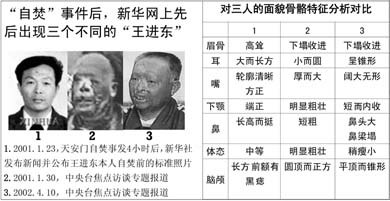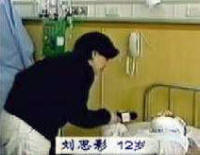54 Facts That Reveal How the "Self-Immolation" on Tiananmen Square Was Actually Staged for Propaganda Purposes - Part 2
11. Microphone, Clearly Visible, Faces Wang
When the scene of Wang Jindong's meditation is carefully observed, you can see a recording microphone flash at the left corner of the screen. The microphone is facing Wang Jindong. The view is quickly moved to the right, in order to hide the microphone. This observation confirms that the camcorder was right in front of Wang Jindong - the best position to videotape. According to the clear shouts of Wang Jindong, the cameraman must have been very close to him, otherwise it would be impossible to receive good audio quality in the recording. This also demonstrates that there was another person videotaping Wang Jindong besides the people who carried the video bag and filmed the scene from a distance.
The words shouted out by Wang Jindong at the time of his immolation and aired on CCTV were recorded so clearly that the recording distance had to be within ten meters. Unless cameras were ready and in place before the incident, the sounds and details couldn’t have been captured so perfectly, as the whole episode lasted no more than a minute or so from beginning to end, according to official reports.
Also worth noting: When a reporter interviews a person outdoors, he will hold the microphone right at the mouth of the speaker so that his voice sounds clearer. On TV, Wang's voice was loud and clear.
12. Several Individuals Play the Role of Wang Jindong
The "Wang Jindong" in the CCTV film (Photo #2) do not match Wang Jindong's photograph (Photo #1). Look at the photo of Wang: the earlobe is close to the head and the shape of the ear is long, whereas the self-immolator's ear is small and round. Was the man who set himself on fire the real Wang Jindong?
The man pictured in a later CCTV interview (Photo #3) also does not match the others.

13. Speech Recognition Technology Proves Different People Played Wang Jindong and Liu Baorong in Interviews
Wang Jindong and Liu Baorong, two of the "self-immolators," appeared on CCTV to give multiple interviews. The World Organization to Investigate the Persecution of Falun Gong (WOIPFG) conducted a study through computer speech analysis. They concluded that the Wang and Liu in the first video were not the same as the Wang and Liu in the second video. The report can be found here.
According to a WOIPFG spokesperson, a reliable source from China revealed that the Wang Jindong in the self-immolation was actually a People's Liberation Army officer.
14. Video Footage Did Not Come From CNN as CCTV Claimed
The Chinese media claimed that it was CNN journalists who recorded the close-up shots. CNN's chief news executive, Eason Jordan, was quoted in the Washington Post as saying that "the footage used in the Chinese television reports could not have come from CNN videotape because the CNN cameraman was arrested almost immediately after the incident began." CNN did not have a chance to shoot any footage.
Why did the police prevent CNN from filming the incident and confiscate the camera? Wouldn't the Chinese government want CNN to take pictures of the incident so that it could be broadcast to the world?
When we look again at the tape from Chinese Central TV, we can see a man carrying a camera bag at the scene. He seems to be shooting the whole incident from close by. Who is he? Why didn't the police stop him the way they stopped the CCN reporters?
Why would the government lie about the source of the videotape? Why wouldn't they reveal the source of the close-ups, even if they were taken by a police officer who just happened to be there on that day?
15. CCP First Claims 5 Practitioners Involved, Then 7
In the initial Xinhua news report, five people were involved in the incident; yet a week later, it was reported that seven people burned themselves and one was a 12-year-old girl. Significantly, one of the CNN reporters on the scene only saw five people and none were children.
16. Twelve-Year-Old Girl Sings After Tracheotomy
Li Chi, Deputy Director of the Burn Department in Beijing's Jishuitan Hospital, said after the incident: "We received four patients. They all had critical inhalation wounds to the trachea. They were in danger of choking at any time. So at the same time we operated on their surface burns, we also immediately performed tracheotomies."

In a tracheotomy, a tube is placed in the throat below the vocal chords so the patient can breathe. The patient cannot use his mouth to breathe, and air cannot get to the vocal cords and larynx, so the patient cannot speak. It takes many days for an adult to adjust to this condition, and much longer for a child. If a patient really wants to speak, he has to cover the tube opening, but the voice will be intermittent and unclear. Yet the reports from an interview of the 12-year-old victim by the Xinhua News agency present a different picture.
The little girl, Liu Siying, was in serious condition: her trachea was cut open, yet she could sing and talk with the interviewers loudly and clearly after only four days. This is a medical impossibility.
17. Liu Siying Denied Family Visitation, Dies Mysteriously
The authorities did not allow any reporters other than those from the Xinhua News Agency to interview 12-year-old Siying, nor did they allow any of her family members to visit. They even threatened her grandmother, to such an extent that the elderly woman was terrified to be interviewed by any reporters.
Medical staff at the Jishuitan Hospital reports that the cause of the death of Liu Siying was highly suspicious. She suddenly died on March 17, 2001 when she was ready to be discharged from the hospital. One of the medical staff, who treated Liu Siying at the Jishuitan Hospital, said, “Liu Siying died suddenly at a time when her burns were more or less healed, her health had basically recovered, and she was ready to be discharged from the hospital. The cause of her death is very suspicious.” During the period of time right before she died, including Friday, March 16, 2001, one day before her death, Liu Siying’s electrocardiogram (EKG) and other tests all showed normal results. Then, on Saturday, March 17, 2001, between 11:00 a.m. and 12:00 p.m., doctors suddenly discovered that Liu Siying was in critical condition. She died shortly afterwards. In addition, on the morning of March 17, 2001, between 8:00 and 9:00 a.m., the head of the Jishuitan Hospital and the head of the Beijing City Medical Administration Division paid a visit to Liu Siying at her hospital room and talked to her for quite a long time. “At that time, Liu Siying was still quite animated and active,” the staff member reported. The autopsy of Liu Siying took place at the Jishuitan Hospital, but the autopsy report was issued by the Emergency Center. In addition, the autopsy report didn’t disclose any discussion of the case. It only made a general statement that her death was likely due to problems with her myocardium.
Among the people accused of self-immolation, Liu Siying is the person who was most likely to divulge the secrets because she was so young that the threats would not have been as effective as they would be used on the adults. The adults could be sentenced to jail or isolated from the outside world, at least temporarily. But Liu Siying was under the legal age of being detained. Therefore, to detain her publicly would have an extremely negative impact, but releasing her would leave them vulnerable that she might speak-out, and let the truth be known. The only way to guarantee her silence and avoid divulging any secrets to the public was to kill her.
18. Fire-Fighting Equipment Suddenly Appears on Tiananmen Square the Day of the Self-Immolation
The Beijing Evening News reported on February 16, 2001 that "there were 3 or 4 police putting out the fire of each self-immolator." Altogether, they had about 25 pieces of firefighting equipment.
This story differed significantly from the program broadcast by Chinese Central TV. The CCTV program showed that there were only two police cars at the scene. Police officers who patrol the Square do not normally carry firefighting equipment, and the footage does not show any firefighting equipment in Tiananmen Square itself. In Beijing, the closest building to the People's Hero Monument is at least 10 minutes away on foot. Where did the police get the equipment and how did they get it so quickly? Why would two police vehicles be carrying 25 pieces of firefighting equipment to patrol Tiananmen Square? Were they expecting to have to put out a fire that day?
19. Fire Extinguishers Were Not the Normal Type Policemen Use
In the video footage, the extinguishers used during the incident are the type similar to larger ones used within a building, with the size being about the length of an adult's arm. Extinguishers found in IVECO patrol cars should be the smaller type, about the length of an adult's forearm. So, it is likely the extinguishers used were brought ahead of time.
20. Woman Drinks Half a Bottle of Gasoline, Lives to Tell About It
Another alleged self-immolator, Liu Baorong, was never mentioned in the news agency’s first report, and there is no footage to show she was in Tiananmen Square. She claimed she was prepared to self-immolate but changed her mind at the last minute when she saw the others burning. In a video interview, she states, “I drank about half a bottle, and wanted to pour the rest on my body.”Drinking one tenth of an ounce of gasoline per pound of body weight will cause death. For someone of Liu's weight, half a bottle of gasoline would be enough to kill.